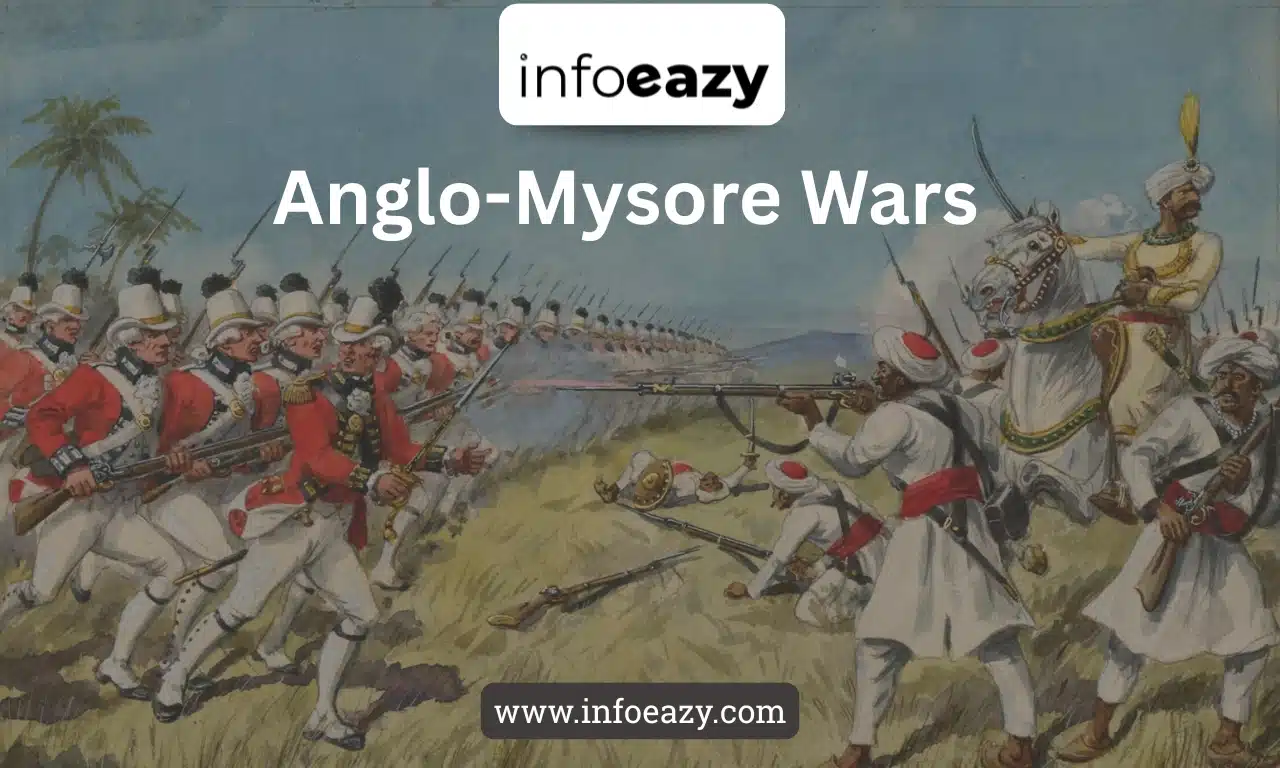The Anglo-Mysore Wars were a significant series of military conflicts fought between the Kingdom of Mysore and the British East India Company during the latter half of the 18th century. These four wars not only shaped the political landscape of South India but also played a pivotal role in establishing British supremacy in the Indian subcontinent.
This article provides a detailed chronological account of the four Anglo-Mysore Wars, highlighting the causes, key battles, treaties, consequences, and major personalities involved.
Anglo-Mysore Wars
The Anglo-Mysore Wars were a series of four major battles fought in South India between the Kingdom of Mysore and the British East India Company from 1767 to 1799. Led by Hyder Ali and later his son Tipu Sultan, Mysore strongly resisted British expansion. These wars played a crucial role in shaping the early phase of British colonial dominance in India. The final war ended with Tipu Sultan’s death and the fall of Mysore to British control.
Anglo-Mysore Wars Timeline
This section provides a concise overview of each of the four Anglo-Mysore Wars. The table below lists their dates, leaders, and outcomes.
| War No. | Period | Key Leaders (Mysore) | Key Leaders (British) | Outcome |
| First War | 1767-1769 | Hyder Ali | British East India Company | Treaty of Madras – Mysore Victory |
| Second War | 1780-1784 | Hyder Ali, Tipu Sultan | Eyre Coote | Treaty of Mangalore – Stalemate |
| Third War | 1790-1792 | Tipu Sultan | Lord Cornwallis | Treaty of Seringapatam – Mysore Loss |
| Fourth War | 1799 | Tipu Sultan | Lord Wellesley | British Victory – Death of Tipu Sultan |
Background of the Anglo-Mysore Wars
The conflicts between Mysore and the British did not arise in isolation. They were deeply rooted in the shifting balance of power after the decline of the Mughal Empire and the expansionist ambitions of colonial powers.
Mysore’s strategic location between the eastern and western coasts made it a valuable region for trade and military movement. The British sought to curb Hyder Ali’s growing influence to protect their interests in South India.
Hyder Ali: The Tiger of Mysore
Hyder Ali was a brave and intelligent military leader who rose from humble beginnings to become the ruler of Mysore. He was known for his sharp strategies and use of European-style warfare. Hyder strengthened the Mysore army and resisted British expansion in South India. His leadership in the First and Second Anglo-Mysore Wars made him a key figure in Indian resistance against colonial rule.
Key Points:
- Born in 1720; started his career as a soldier in Mysore army
- Became Sultan of Mysore in 1761 through merit and military skill
- Modernized the army using French military techniques
- Fought bravely against the British in the First and Second Anglo-Mysore Wars
- Died in 1782 during the Second Anglo-Mysore War; succeeded by his son Tipu Sultan
First Anglo-Mysore War (1767-69)
This war was fought between Hyder Ali of Mysore and the British East India Company. Hyder Ali showed his military strength and nearly defeated the British. In the end, a peace treaty was signed as both sides feared losing more.
Key Points:
- Fought between Hyder Ali and the British East India Company
- Hyder Ali formed alliances with the Nizam of Hyderabad and the Marathas
- The British underestimated Hyder’s power
- Treaty of Madras (1769) ended the war
- Both sides agreed to help each other if attacked in the future
Second Anglo-Mysore War (1780-84)
This war began when the British broke the earlier treaty. Hyder Ali and later his son Tipu Sultan gave a tough fight. Tipu emerged as a powerful leader after Hyder’s death.
Key Points:
- Started due to British betrayal of the Treaty of Madras
- Hyder Ali invaded British territories
- Tipu Sultan continued the war after Hyder’s death in 1782
- Treaty of Mangalore (1784) ended the war
- Both parties returned captured territories
Rise of Tipu Sultan
After Hyder Ali’s death, his son Tipu Sultan took charge and intensified Mysore’s military modernization. His leadership brought innovation and resilience to the Mysorean resistance.
Tipu Sultan, also known as the “Tiger of Mysore,” was a skilled warrior, administrator, and diplomat. He implemented various modern reforms, including a centralized revenue system, European-style military training, and technological innovations such as the use of iron-cased rockets in warfare.
His relentless opposition to British domination and alliance with the French made him a major threat to British interests.
Third Anglo-Mysore War (1790-92)
This war was mainly between Tipu Sultan and a combined force of the British, Marathas, and Nizam. Though Tipu fought bravely, he was forced to surrender some regions and his sons as hostages.
Key Points:
- Tipu Sultan fought against a three-party alliance
- British were led by Lord Cornwallis
- War ended with the Treaty of Seringapatam (1792)
- Tipu had to give away half of Mysore’s territory
- He also gave two sons as hostages to the British
Fourth Anglo-Mysore War (1799)
This was the final and most decisive war. Tipu Sultan fought till his last breath but was killed in battle. Mysore lost its independence and came under British control.
Key Points:
- Tipu Sultan fought against British forces led by Lord Wellesley
- Tipu died while defending Seringapatam
- The British took full control of Mysore
- The Wodeyar dynasty was restored under British supervision
- Marked the end of Mysore as a powerful kingdom
Causes of the Anglo-Mysore Wars
The Anglo-Mysore Wars were triggered by a variety of political, strategic, and economic reasons. The table below outlines the major causes that led to repeated confrontations.
| Causes of the Anglo-Mysore Wars | |
| Category | Details |
| Political | Power struggle between Mysore and British in Southern India |
| Strategic | Control over ports, trade routes, and rich agricultural regions |
| Diplomatic | Shifting alliances among Mysore, Marathas, Nizam, and British |
| Colonial Ambitions | British efforts to eliminate powerful native states |
| Treaty Violations | British non-compliance with previous treaties (Madras, Mangalore) |
Key Personalities Involved
Several influential leaders shaped the course of the Anglo-Mysore Wars. Their actions and decisions played a crucial role in determining the outcomes of each conflict.
| Key Personalities Involved | |
| Name | Role and Contribution |
| Hyder Ali | Founder of Mysore’s military strength; leader of 1st and 2nd Wars |
| Tipu Sultan | Successor of Hyder Ali; led 2nd to 4th Wars, symbol of resistance |
| Lord Cornwallis | British Governor-General, architect of victory in 3rd War |
| Lord Wellesley | Led British campaign in the 4th War, established total control |
| Eyre Coote | Played a key role in turning the tide in the 2nd War |
Impact of the Anglo-Mysore Wars
The Anglo-Mysore Wars drastically changed the course of Indian history. The defeat of Mysore dismantled one of the most formidable Indian kingdoms. It paved the way for further British expansion and set a precedent for future colonial conquests.
Tipu Sultan’s legacy as a fierce patriot, military innovator, and reformer continues to inspire generations. His use of rockets and early attempts at modernization were ahead of their time.
Anglo-Mysore Wars FAQs
Q1. What were the Anglo-Mysore Wars?+
Q2. Who fought the Anglo-Mysore Wars?+
Q3. Who was Hyder Ali?+
Q4. What was the outcome of the First Anglo-Mysore War?+
Q5. What caused the Second Anglo-Mysore War?+
Tags: Anglo-Mysore Wars




